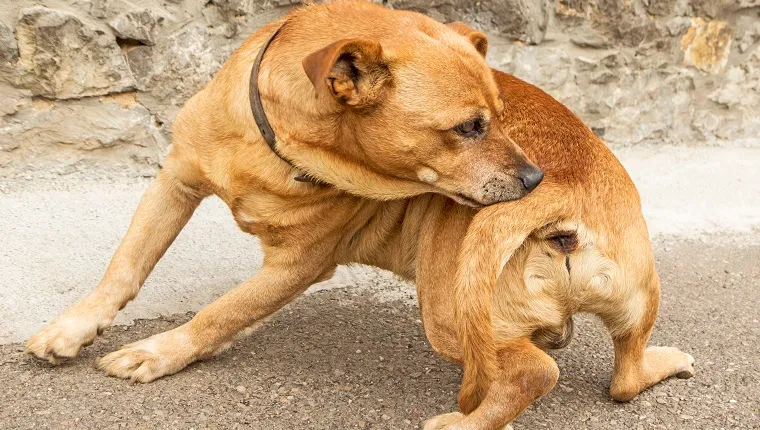Allergic reactions in dogs can be difficult to spot, as they vary in type, severity, and cause. Almost any substance can trigger allergic reactions in dogs, though there are some allergens that are more common triggers than others.
Symptoms range from mild to severe, and extreme reactions can result in anaphylaxis, a potentially life-threatening condition. If your dog shows signs of severe swelling, difficulty breathing, seizures, or shock, then you should get to an emergency veterinarian right away for treatment.
For allergic reactions that are not life-threatening, you should seek a proper diagnosis from your vet and provide recommended treatment, as well as eliminate or reduce exposure to allergens if possible.
Here’s what you should know about the symptoms, triggers, and treatments for allergic reactions in dogs.
Symptoms Of Allergic Reactions In Dogs

The symptoms of allergic reactions in dogs can be moderate to extreme. They can affect the skin, ears, respiratory system, digestive system, or other parts of the body.
These symptoms vary depending on the type of allergy, as well. Seasonal allergies, food allergies, flea allergies, medication allergies, and more can all result in different symptoms, and sometimes they can mimic the signs of other medical conditions.
Consult your vet for a proper diagnosis if you see any of the following signs:
- Itching, especially around the ears, eyes, or tail
- Dermatitis
- Ear infections
- Swelling
- Hives
- Inflammation or redness
- Alopecia
- Butt scooting
- Watery eyes
- Coughing
- Sneezing
- Vomiting
- Diarrhea
- Chewing or licking, especially at the paws
- Snoring
Triggers Of Allergic Reactions In Dogs

Almost any substance can trigger allergic reactions in dogs, though some allergens are more common causes of reactions.
One reason allergies to these substances might develop is genetic predisposition. Another reason is constant exposure; for example, allowing dogs to eat the same foods all the time, especially grains and chicken, can make allergies more likely to develop.
Here are some of the most common allergens that trigger allergic reactions in dogs:
- Dust
- Dander
- Mold
- Pollen
- Fungus
- Insect bites, especially fleas
- Food, especially grains or chicken
- Feathers
- Cigarette smoke
- Medications
- Perfumes
- Cleaning products
- Fabrics
- Certain shampoos
- Rubber or plastic
Treatments For Allergic Reactions In Dogs

The treatment for allergic reactions in dogs depends on they type of allergy and the symptoms that develop. Treatment can focus on reducing symptoms or preventing them.
If your dog experiences allergic reactions, then it’s best to follow your vet’s recommendations for treating them. They may prescribe medications such as antihistamines or corticosteroids, or they may recommend using over-the-counter drugs like Benedryl. There are also therapeutic shampoos that may relieve symptoms.
There are several other options for treating allergic reactions in dogs, and many dog parents choose to use natural, homemade remedies such as apple cider vinegar, oat baths, or coconut oil. Providing your dog with Omega-3 fatty acids may improve coat health and also reduce skin reactions.
You should research these options for yourself and discuss them with your vet before deciding if they are right for your dog.
When it comes to preventing allergies, there are many possible solutions. One is hyposensitization therapy. This is done by taking your dog to the vet for a series of injections that expose your dog to allergens, which gradually helps their immune system grow accustomed to them.
For day-to-day prevention of allergy symptoms, wiping off your dog’s paws after walks can help, as well as using hypoallergenic shampoos and switching to a hypoallergenic diet. Limiting exposure to allergens, if possible, can also go a long way in stopping symptoms from appearing.
You should ask your vet for further advice for treating your individual dog.
Does your dog have any allergies? What do you do to reduce your dog’s allergic reactions? Let us know in the comments below!









